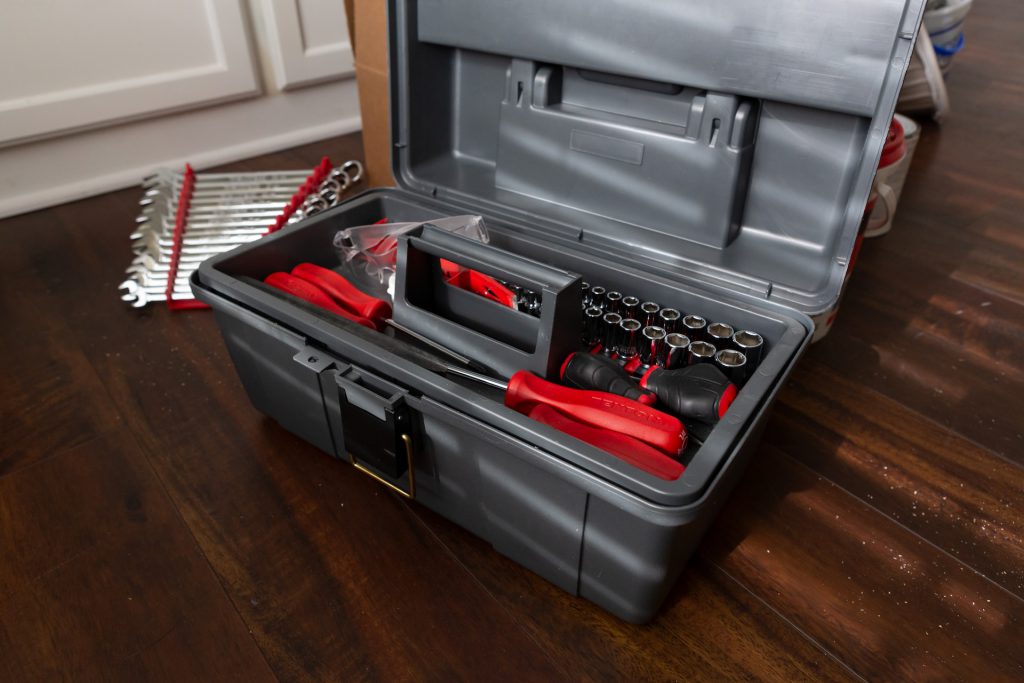Every DIY enthusiast knows the importance of a well-equipped toolbox. Whether you’re tackling home renovations, minor repairs, or creative projects, having the right tools at your disposal is crucial. This comprehensive guide will walk you through the 16 must-have tools for your toolbox, ensuring you’re prepared for any task that comes your way.

1. The trusty hammer
A hammer is indispensable in any toolbox. Ideal for driving nails, breaking objects, and various other tasks, a solid hammer is a DIY staple.
Types of hammers
– Claw Hammer: Perfect for driving and removing nails.
– Ball Peen Hammer: Ideal for metalworking.
2. Versatile screwdrivers
A set of screwdrivers, both flat-head and Phillips, in various sizes, is essential for any DIY task involving screws.
Screwdriver tips
– Magnetic tips can be a lifesaver for holding screws.
– Insulated screwdrivers are crucial for electrical work.
3. The universal pliers
Universal pliers are versatile tools for gripping, twisting, cutting, and adjusting various objects.
Using pliers safely
– Always ensure the pliers’ teeth are sharp and clean for a firm grip.
– Use the right pliers for the job to avoid damage.
4. Long-nose pliers
Long-nose pliers are perfect for reaching into tight spaces and gripping small objects.
Applications of long-nose pliers
– Ideal for bending wires or retrieving small items from tight spots.
5. Accurate tape measure
A reliable tape measure is crucial for precise measurements in any project.
Tape measure features
– Look for one with both metric and imperial measurements.
– A locking mechanism can be very helpful.
6. The essential level
A bubble level ensures your projects are perfectly aligned and level.
Types of levels
– Laser levels for accuracy in longer distances.
– Torpedo levels for small, confined spaces.
7. The handy saw
A saw, be it a hand saw or an electric one, is necessary for cutting wood, plastic, or metal.
Choosing the right saw
– Hand saws for manual control.
– Electric saws for more power and efficiency.
8. Adjustable wrenches
Wrenches are vital for tightening and loosening bolts and nuts.
Wrench varieties
– Open-end, box-end, and combination wrenches for different uses.
9. Quality scissors
A pair of sharp scissors is useful for cutting various light materials.
Scissor selection
– Heavy-duty scissors for tougher materials.
– Precision scissors for delicate tasks.
10. Duct tape: The quick fix
Duct tape is a quick solution for many temporary fixes.
Uses of duct tape
– Temporary repairs, sealing, and binding.
11. A trustworthy flashlight
A flashlight is essential for illuminating dark work areas.
Flashlight features
– LED flashlights for brightness and efficiency.
– Headlamps for hands-free operation.
12. Wire strippers
Wire strippers are necessary for safely removing insulation from electrical wires.
Safe wire stripping
– Always ensure the power is off before stripping wires.
13. A variety of nails and screws
Keep a selection of nails, screws, and anchors for various projects.
Organizing fasteners
– Use a compartmentalized box for easy access and organization.
14. Protective work gloves
Work gloves protect your hands from injuries during manual work.
Choosing gloves
– Select gloves based on the type of work – heavier for construction, lighter for precision tasks.
15. Safety glasses
Safety glasses are crucial for protecting your eyes from debris and harmful chemicals.
Eye protection tips
– Ensure they fit well and provide adequate coverage.
16. Pencil and paper
Always handy for taking measurements and marking surfaces.
Note-taking and planning
– Keep a small notebook and pencil for jotting down ideas and measurements.
Remember, this list is a starting point. Depending on your specific needs, you may require additional, more specialized tools. A pro tip: always ensure your tools are of good quality and well-maintained. This not only guarantees your safety but also ensures the success of your projects.

 Open Immovlan
Open Immovlan